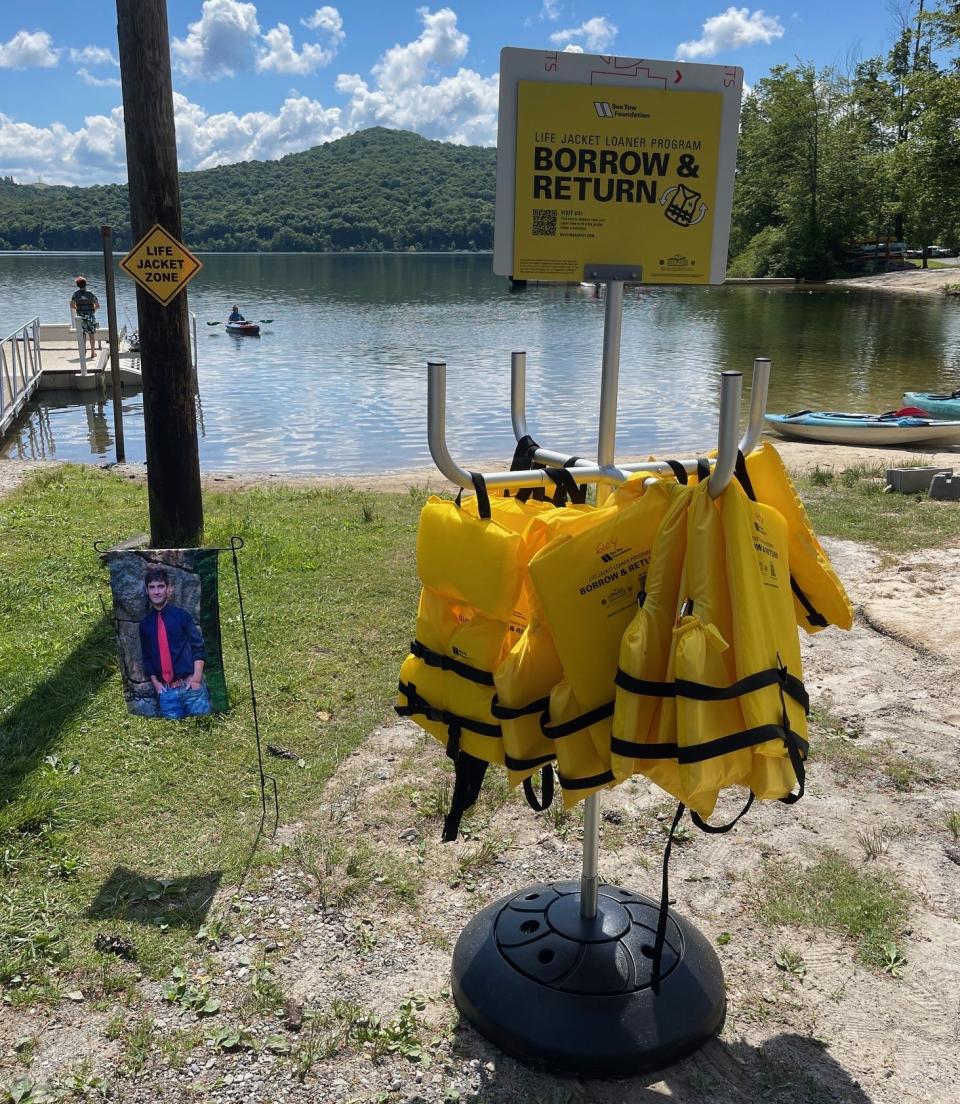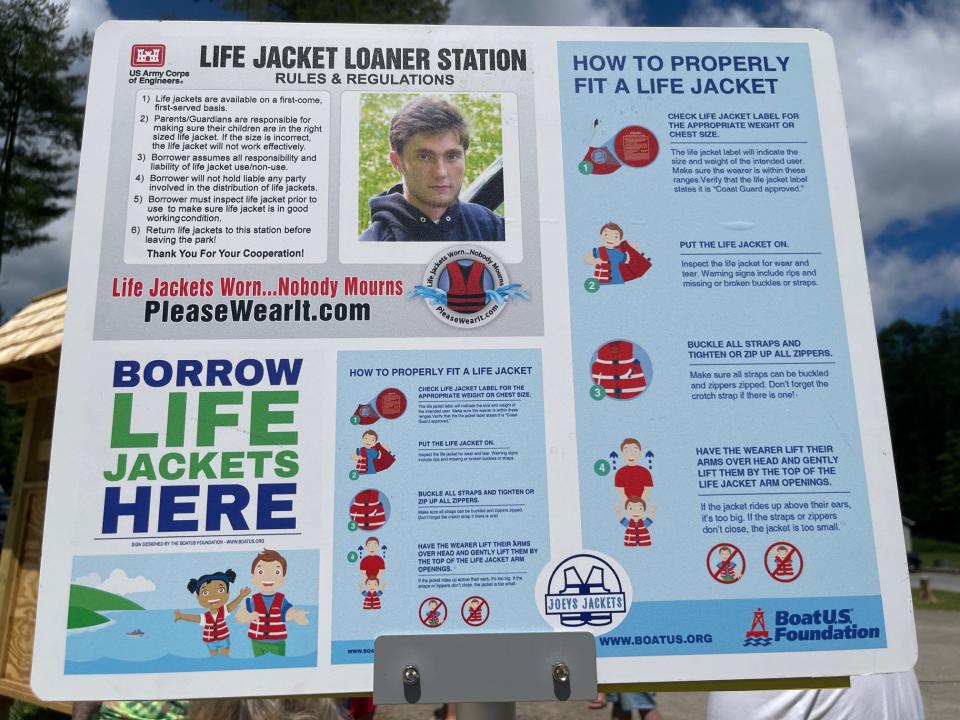'Please wear a life jacket:' Why this couple launched a nonprofit to promote water safety
HOLLSOPPLE ― Kristene Dubics and her husband, Tom, are determined to put life jacket loaner stations at public recreation areas across western Pennsylvania – and urge people to use them.
The latest station opened in June at the Quemahoning Family Recreation Area (QFRA), the same place where, almost six years ago, their 18-year-old son Joey drowned while paddleboarding on the reservoir with friends.
Celebrating the USA: Looking for Fourth of July festivities? Here are some we've found

Even though Joey was an expert swimmer and had a life jacket with him, Kristene said he was not wearing it when he dove into the reservoir to retrieve an item that fell into the water. After five days of intensive searching by water rescue teams and other volunteers, Joey’s body was found 79 feet below the surface of the water.
'Like wearing a seat belt'
So now the Dubics, from Seward, have started Joeys Jackets, a nonprofit organization that collects life jackets to hand out or to loan to people at public recreation areas, including the QFRA.
An equally important part of their mission is to teach children and adults about water safety and the importance of wearing life jackets when swimming or enjoying any kind of water sports, they said.
“We lose 4,000 people a year in the United States to drowning – 11 busloads of children a year – and 80% of that could be prevented if you wear a life jacket,” Kristene Dubics said.
“We want to change that by placing these (loaner) boards, and I’m going to keep trying to educate people on the importance of life jackets. We want it to be normal, like (wearing) a seat belt.”
So far, they have collected about 500 life jackets, most of which have already been given away or are being used at loaner stations like the one at the QFRA. The loaner stand and 30 life jackets at the QFRA were provided by the Shade Creek Watershed Association.
“Annette Jones from the Benscreek Watershed, she was such an advocate. She connected me to people who knew people who knew people, and that’s how the Shade Watershed got involved. They got a grant for the stand and 30 life jackets,” Dubics said.

“I want to thank the CSA (Cambria Somerset Authority) for allowing this to happen, I want to thank Tausha (Garretson, QFRA manager) and the Que crew for your unwavering support all these years. I want to thank the Shade Watershed for getting the grant for the stand and the life jackets and the Benscreek Watershed for supporting us.”
The first person to borrow a life jacket at the loaner station was Heidi Draeger, a paramedic with Conemaugh Township EMS who worked on the search detail and has supported the Dubics family since Joey's body was recovered.
Long-distance friendship: Somerset PA, and England pen pals still going strong after 77 years
Turning grief into action
Since Joey’s death, Tom and Kristene have often camped at the QFRA in the summer. Despite the circumstances, staying at the reservoir gives them peace and a sense of his presence, Kristene Dubics said.
“My son’s last words were, he was laying on the board and he said, ‘It’s so beautiful here.’ It was my last gift from my son. That was his last gift to us,” she said.
It’s also where they discovered how to turn their grief into something purposeful.
“Last year when we hit the five-year mark, I knew I wanted to do something,” Dubics said. “We camp here, and we saw different ones going in (the reservoir) without life jackets, they didn’t have them. So we carried them in our camper, and we were giving them out. And one day, Joeys Jackets just popped in my head.
“I investigated, and there are loaner stands all over the country. There’s 1,300 through the Sea Tow Foundation, there’s 650 through the Boat U.S. Foundation. I just took it from there and we started collecting them. We just did it on a small scale and a friend of a friend told someone, it was in the newspaper and we were interviewed and we got more and more life jackets.”
The loaner stands also have a sign that explains how to put on a life jacket properly, because that is as important as having the life jacket to wear in the first place, Dubics said.

“If it’s not fitting right, you can drown, you can slip right out of it. That’s why on the back (of the sign are instructions) to show you how to put it on (correctly),” she said.
Collecting life jackets will be continually ongoing, Dubics added, and anyone who wants to donate life jackets can message her through the Joeys Jackets Facebook page.
Currently, there are loaner stands at Prince Gallitzin State Park and at the QFRA, and Dubics said she is working to place stands at more public recreation areas in western Pennsylvania.
Better service: Why 5G cellular service is now available in and around Hooversville
There have been liability concerns expressed by some of the organizations that manage these recreational properties, but Dubics said she has learned that Pennsylvania law does protect these landowners from liability.
“Some of the places are turning me down because of liability (concerns), but there is a Recreation Immunity Act (Act 98 of 2018) that protects all these places,” she said. “An insurance agent told me that. I looked into it and there is such an act, so I’m trying to push that too.”
'I want to save them all'
Life jackets are available at the loaner station for anyone to use, from infants to adults. Dubics also plans to check the loaner stands weekly and replace any jackets that are worn, damaged or otherwise need to be replaced.
She encourages anyone to borrow a life jacket at the loaner station before they go into the water, regardless of whether they’re in the public swimming area or on a paddleboard, kayak or boat on the open water.
“If they need it, take it, I don’t care if they’re swimming or whatever,” Dubics said. “You can drown in half a cup of water – an adult in 60 seconds, and a child in 30 seconds.”
And that’s the other part of their mission – to educate the public about the importance of water safety and why wearing a life jacket is so important, even for experienced swimmers.
Dubics said she’s talked to elementary and high school students, Scout groups, outdoors programs, anywhere she can get the message out that life jackets save lives. She’s also willing to hand out life jackets to those who can’t afford them.
“I’ll go anywhere, schools, groups, churches to talk about water safety,” Dubics said. “I don’t want a child to go without (a life jacket) if I can help it.
"(Joey) swam since he was 3, but he still died with his life jacket on his board because ‘he didn’t need it.’ He was an excellent swimmer, but you don’t realize the difference between open water and pool water – I didn’t teach him that. This water (at the Quemahoning Reservoir) is 100 feet deep, and our pool is 5 feet deep. Any open water, you don’t know deep it is. I’m trying to push that, to have a sign that says how deep the water possibly could be. It could be that light bulb moment for someone.
“People go out here with their life jacket strapped to their board – we tell them, 'How are you going to get it?' (They reply,) ‘Oh, I’ll get it.’ No, you’re not going to get it. (His life jacket) wasn’t strapped onto Joey’s board, he could’ve grabbed it but he just went down. He was in excellent shape, but his muscles all seized up (because of the water temperature). The divers told us because he had no body fat on him, he seized up quicker.”
So now Kristene and Tom Dubics and Joeys Jackets will continually promote water safety across the region, in Joey’s honor.
“I don’t want another mother to have to go to sleep without her baby,” Kristene Dubics said. “I want to save them all.”
Beth covers news in the northern communities of Somerset County for the Daily American. Send any story ideas to her at bethm@dailyamerican.com.
This article originally appeared on The Daily American: Family starts nonprofit to promote life jacket use and water safety

